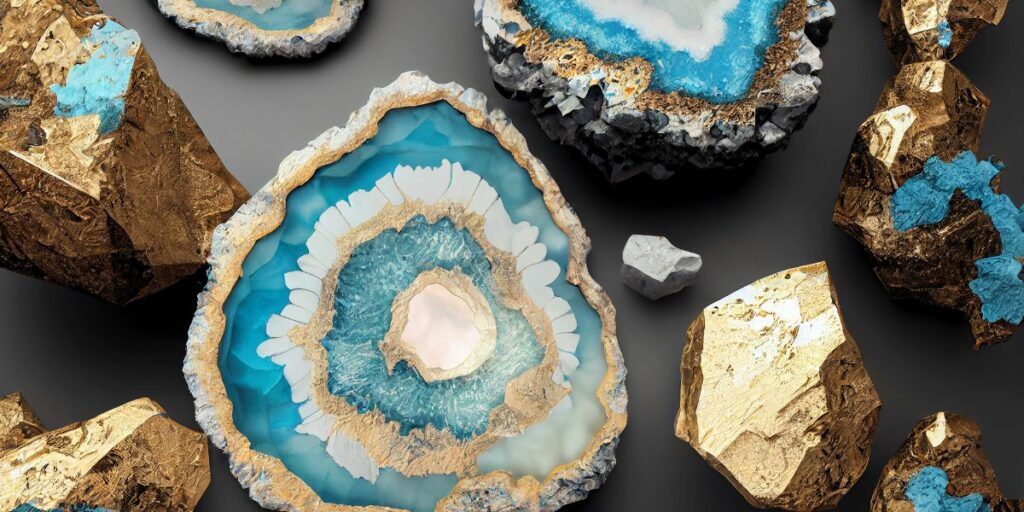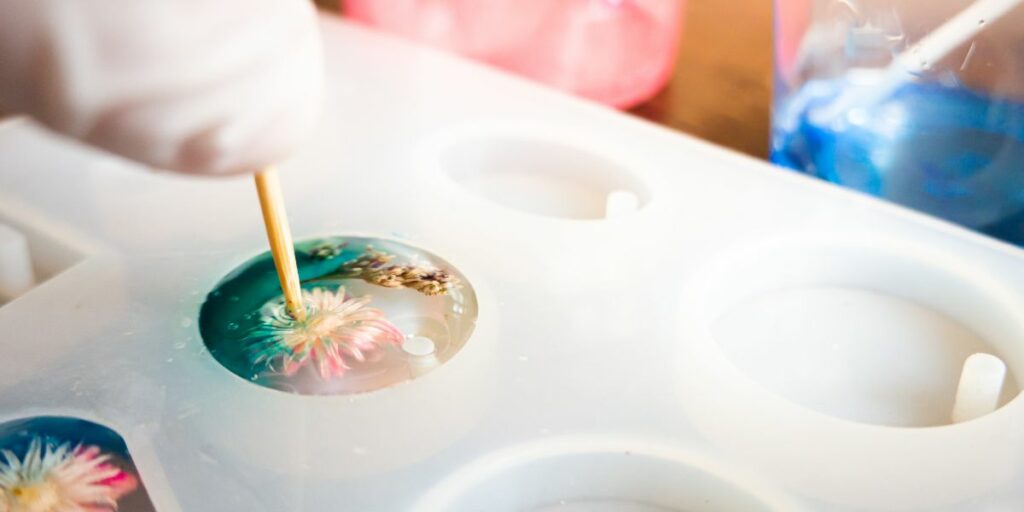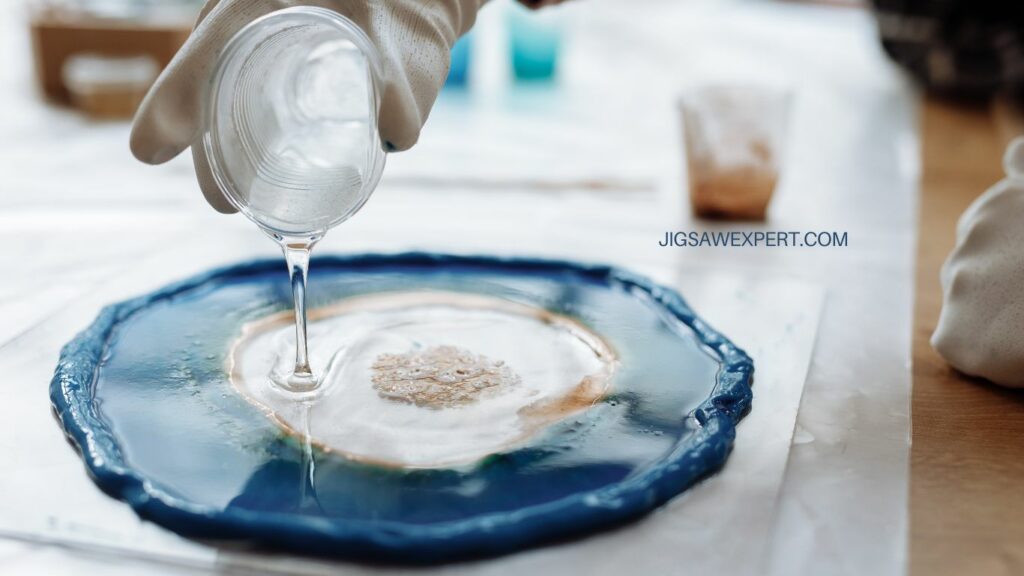Epoxy resins are a type of polymer that has become increasingly popular in a variety of industries due to their versatility and durability. There are many different types of epoxy resins, each with its own unique properties and applications.
In this article, we will be exploring 3 of the most commonly used types of epoxy resins: UV Resin, Polyester Resin, and Polyurethane Resin.
Each of these 3 types of resins has its own set of advantages and disadvantages. Understanding the differences between them is crucial for making informed decisions about which one is best suited for your needs.

Whether you’re a manufacturer seeking to create a strong, durable, and long-lasting product, an artist or DIY guy looking for new materials to incorporate into your work, or simply someone who wants to know more about this innovative material, this article will provide you with a comprehensive overview of the different types of epoxy resins available.
The major parts of epoxy resins are made up of two elements, namely the base resin and a catalyst (which is a hardener). Combining the two elements results in a chemical reaction which allows the resin to set.
UV Resin however only has 1 component, as the chemical reaction only starts when exposed to Ultraviolet (UV) light.
Epoxy Resin Types based on Application

Due to their strength, durability, and versatility, epoxy resins are a popular choice in various industrial and household applications. Based on these applications, we can categorize them into two main types of epoxy resins: casting resins and coating resins.
Casting Resin
Casting resin is a type of epoxy resin that is usually thinner. Their curing time is usually slow, which gives ample time to adjust the mold before the resin sets. It is a particularly useful type of epoxy resin.
Casting resin can be used to fill an unfilled area or void in a piece made of wood or other materials. It can also be used to completely sink an item in the casting resin thereby preserving the item.
Casting resins are used to create molded products, like, jewelry, figurines, and many decorative items.
Usually, Polyurethane resin is used for molding and casting. Although you can use other resins too, but polyurethane is simply considered the best, and industry standard for making products.
Coating Resin
Coating resin is a type of epoxy resin that can be used to effectively coat an item or surface and in doing so provide a heavy-duty safety finish. They are usually thicker, stiffer, and harder than casting resins.
Coating resins are used to provide a protective and decorative layer to surfaces, such as floors, countertops, and walls. Their curing time is usually faster and typically provides excellent adhesion and abrasion resistance.
Coating resins come in a variety of grades, including fire-resistant, electrical insulation, and UV-resistant properties. They also provide a high-shine finish.
The UV Resin Type
UV resin differs in overall setting process and chemical texture. While other epoxy resins have two parts that need to be combined in order to set, UV resin only requires ultraviolet light to set. They set quickly as the setting process is activated when exposed to UV light.
No products found.
Molecular Formula: C12H18O4
Applications of UV Resin
UV Resin sets only when exposed to Ultraviolet light. This gives enough time for adjustment to molding. Here are some of the applications of UV Resin.
- Jewelry making: UV resin is commonly used in jewelry making as it sets quickly and creates a crystal clear finish.
- Crafts: UV resin is a popular choice for various craft projects as it gives enough time to adjust and sets quickly when UV light is applied. This allows for easy, fast, and precise application.
- Dental materials: UV resin is used in dentistry as it sets quickly when UV light is applied.
- Laminating: UV resin can be used in laminating.
- Wood finishing: UV resin can be used as a protective finish for wood because it creates a strong and glossy surface.
- Electronic Encapsulation: UV resin is used to encase and protect electronic components, providing insulation and protection from moisture and other environmental factors.
- 3D Printing: UV Resin is a commonly used 3D printing material of high accuracy and durability. It is used in SLA (Stereolithography) 3D printing to create solid objects by curing the resin layer by layer with UV light.

This particular type of resin will only be set correctly if exposed to UV light. The length of time required to set the item is all dependent on the size of the piece and the solidness of the resin.
Pros of UV Resin
- Faster Setting Time: It sets quickly upon exposure to ultraviolet light. Which allows for faster completion of projects.
- Clear Finish: With UV resin, your projects will have a crystal-clear finish that enhances their appearance.
- Convenient: It’s a convenient alternative to traditional two-part epoxy resins as it only requires ultraviolet light to set.
- Easy to use: UV resin is simple and easy to use as it does not require any mixing.
Cons of UV Resin
- UV Sensitivity: As UV resin is sensitive to UV light, It can yellow over time or when exposed to sunlight for a longer time.
- Brittle: It can be brittle and may break or crack if not handled carefully.
- Expensive: UV resin is often more expensive than other traditional epoxy resins.
- Require Special Equipment: UV resin requires a UV light source to set, which can be an added expense and it may not be readily available.
The Polyester Resin Type
Polyester resin is a versatile and cost-effective material used in many industrial and consumer applications. It is made from polyester polymer and is famous for its strong bonding properties and resistance to environmental factors like moisture and chemicals.
Polyester resin is an essential ingredient in the making of a wide range of products which range from fiberglass reinforcement to cast polymer products and adhesives.
Polyester resin has the ability to form strong bonds and retain its shape making it a popular choice for various industries.
Whether you are working on a DIY project or producing commercial products, polyester resin is an excellent choice for adding strength, durability, and a professional finish to your work. It is most commonly used in building boats, swimming pools, and ponds.
No products found.
Molecular Formula: HO–CH2–CH2–OH
Application of Polyester Resin
Polyester resin is a versatile and cost-effective material with a variety of applications. Its resistance to environmental factors such as moisture and chemicals adds to its versatility and makes it a popular choice for many projects.
When it comes to applications, polyester resin is used in a wide range of products, including fiberglass reinforcement, cast polymer products, and adhesives. It is a key ingredient in the manufacturing of strong and durable goods, from boats and shower stalls to countertops and automotive parts. Its ability to form strong bonds and retain its shape makes it an ideal choice for those seeking to add strength and durability to their work.
Pros of Polyester Resin
- Polyester resin is very affordable.
- When using polyester resin, the drying or curing time can be determined by yourself, depending on the amount of hardening solution used when formulating the resin.
- As previously mentioned, polyester resin is resistant to environmental factors, like, water moisture, and even chemicals.
- Polyester resin has a strong bonding capability
- It is simple to use and does not require special equipment.
- It adds strength and durability to your work
Cons of Polyester Resin
- Unfortunately, all types of polyester resin are known for their irritating smell.
- The overall mixing process can be more technical and therefore more difficult than other types of resin, as it is up to you to determine the desired levels when combining the two elements.
- Over time it is prone to yellowing and can impact its appearance.
- It has brittleness up to some limit, so susceptible to cracking or breaking if not handled carefully.
If you are using this type of resin to laminate, you begin by applying the first layer of resin onto the surface and then layer on top a sheet of glass fiber, you can then apply another layer of resin.
In doing so you make the glass fiber mat flexible, ensuring you can shape it easily.
The Polyurethane Resin Type
Polyurethane resin is a unique and innovative material that is widely utilized in various industries due to its exceptional versatility. This versatile polymer, made from a combination of organic and inorganic materials, is known for its impressive durability and resistance to environmental factors, making it a popular choice for a wide range of applications.
Its ability to mimic the feel and texture of various materials has led to its widespread use in industries ranging from construction and manufacturing to art and design. Its outstanding versatility, combined with its strength and durability, make it an ideal choice for anyone seeking to add a professional and long-lasting touch to their work.
Polyurethane resin can be used for casting molds. It is used in the manufacturing of a wide range of products, thanks to its easily manipulated properties.
Polyurethane resin is a very durable resin that becomes very hard when set by heat. Heat curing also reduce the amount of setting time by 1/4 to its actual setting time. I.e. By applying heat, the cure time will reduce to about 4 hours from 16 hours.
There are many different types of polyurethane resin, which are put to use in a variety of industries.
For example, one can find many polyurethane products within appliances and is also widely used within the automotive industry.
No products found.
Molecular Formula: C27H36N2O10
Applications of Polyurethane Resin
Polyurethane resin is a versatile and innovative material that is used in a wide range of industries. Due to its incredible properties, it is being used in the following.
- Manufacturing of furniture and foam products
- Protective coatings
- Cast polyurethane products
- Adhesives
- Automotive parts
- Medical equipment
- Synthetic leather products and many more
In addition to its applications, there are some pros and cons of using Polyurethane resin.
Pros of Polyurethane Resin
- It is durable and long-lasting.
- Resistant to heat, moisture, chemicals, and other environmental factors.
- It has the ability to mimic the feel and texture of various materials.
- Versatile and can be used in a variety of industries.
- Offers impressive strength and flexibility.
- When setting there is only a very small amount of shrinkage.
- Polyurethane resin can be easily mixed, as it has very good flow properties.
- Polyurethane resin can be used as an electrical encapsulation.
Cons of Polyurethane Resin
- Expensive than other types of resins
- It can be more challenging to work with than other types of resins
- May require specialized equipment and expertise
- Can be less environmentally friendly than other types of resins
- Can be more prone to yellowing over time, compared to other resins
- Polyurethane resin isn’t as sticky as other types of epoxy resins.
- Gives off an unpleasant smell when curing.
Polyurethane resin is an incredibly versatile and innovative material that is widely utilized in many industries due to its exceptional durability and resistance to environmental factors.
Its impressive ability to mimic the feel and texture of various materials makes it a popular choice for those seeking to add a professional touch to their work.
However, its high cost and specialized equipment requirements, along with its potential yellowing over time, are important factors to consider before making a final decision.
FAQs
Last update on 2025-07-08 / Affiliate links / Images from Amazon Product Advertising API. Note: Jigsaw Expert may earn a commission when you buy through links on our site.